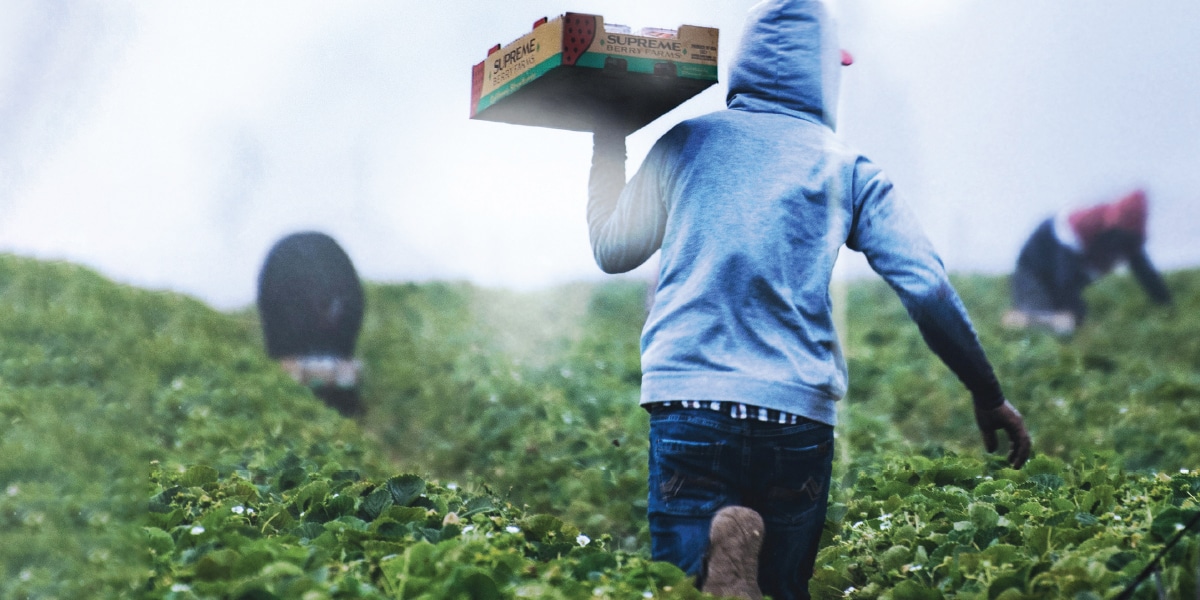Behind every meal, there’s a story of sacrifice; Julie Taylor’s work at the National Farm Worker Ministry brings to light the often invisible and harsh realities of farm labor in the United States.
Julie Taylor remembers growing up working long days on her grandparents’ farm in rural Alabama. They would pick vegetables, but before that, her grandparents raised cotton and peanuts for their livelihood. It was hard work, but she could always go inside for a bathroom or water break. On blistering hot summer days, she had the luxury of completing her work in the morning. Never was she harassed or abused or treated as anything less than a human being.
Decades later her life would come full circle when she joined the board of the National Farm Worker Ministry (NFWM) and was introduced to the plight of farmworkers in America. NFWM, which began in 1920 as a “ministry of charity and service, providing food, clothing, and day care to farmworkers,” shifted its focus to justice in the 1960s in response to the call of activist and United Farm Workers (UFW) cofounder Cesar Chavez.
“When I went to La Paz [California, where United Farm Workers is located] and started to learn about farmworkers in this country, I was just astounded,” Taylor reflects. “I had always complained about working on my grandparents’ farm because it was such hard work. Finding out that it was so different for so many of the farmworkers in our country who were supplying our fruits and vegetables, I don’t know, I guess it just gripped my heart.”
The challenges farmworkers face are many: Third-rate housing and shoddy pay. A host of health concerns includes pesticide exposure, lack of access to clean drinking water, the impact of climate change as farmworkers labor for ungodly hours in the heat of the day, and insufficient access to medical care. Even reports of child labor or physical and psychological abuse unfolding in the fields. Combine it all and there is a compelling case that a form of modern-day slavery exists on many farms throughout the United States of America (learn more at NFWM.org/farm-workers).
Taylor was active on the NFWM board for 13 years before becoming executive director in 2015. It was interesting timing. Donald Trump’s election and presidency began shortly after, fueled by rhetoric that demonized undocumented immigrants and threatened mass deportation.
The Lifeblood to the American Food Supply
Taylor’s team had seen lots of shocking things at labor camps for farmworkers. But never had they witnessed something like this. The year was 2016. Worker after worker approached them, timidly explaining to them in limited English, “I’m not a criminal, I’m just here to work.” Rhetoric has a cost.
NFWM staff often visit labor camps so they can learn about the struggles farmworkers face, listen to their stories, and advocate for them via both policy and connecting them with farmworker organizing groups who want to help. Addressing the crippling fear of deportation felt like three steps back in their advocacy work, which had historically focused on addressing their rights as workers, as human beings with hearts and minds, stories and souls.
Taylor, however, is quick to point out that it’s not that the fear of deportation was nonexistent in the past; it has only recently been amplified. She remembers the infamous 2008 raid of a meatpacking plant in Postville, Iowa, during the Bush administration. The raid was one of the largest immigration enforcement actions in US history at the time, resulting in the arrests of 389 undocumented workers. The raid in Postville is a window into what could happen if current rhetoric is backed by action. The plant, the largest employer in Postville, had to file for bankruptcy six months later, as arrests and deportations led to a labor shortage and tanked the local economy. This historic raid eventually impacted the American food supply chain. Deportations also thrived under the Obama administration, which had more formal removals (3.2 million) than Bush (2 million) and earned him the “deporter-in-chief” moniker by immigrant rights activists.
A frequently echoed sentiment during election cycles is: “I support immigration if it’s legal.” But as the region around Postville quickly realized in 2008, that’s a trope at best. When it comes to farmworkers, it’s estimated that 50 to 60 percent of fresh produce in our grocery stores come from American farms, and, according to the National Agricultural Workers Survey by the US Department of Labor, 45 to 50 percent of farmworkers in America are undocumented immigrants. In other words, mass deportation of undocumented farmworkers would not only lead to the lives of hardworking people longing for a better life being uprooted but could also make food prices soar and lead to an economic collapse. Just like Postville.
The irony is that the American food supply hinges on the labor of undocumented workers, yet their undocumented status leaves them prey to exploitation. Poor housing, low wages, harsh working conditions, limited access to health care, and pervasive racism and bias can thrive when those in power face no accountability. This situation can breed a profound cognitive dissonance among employers who, while exploiting these workers, also believe they are offering them a lifeline by providing employment, potentially at wages higher than what they might earn in their countries of origin. Numerous states have attempted to address illegal immigration by mandating an E-Verify system for farmworker employment, yet this frequently leads to a labor shortage, causing crops to spoil across American fields.
“It’s not just about human beings coming here [via illegal immigration],” says Taylor. “It’s about the way in which our agribusiness system works. And honestly, we are dependent on the farmworkers who are coming to us from Mexico and parts of Central and South America to pick our fruits and vegetables so that we have them in our grocery stores.”
Farmworkers are often labeled as “unskilled workers,” but Taylor notes that very few people can or are willing to do what farmworkers do. It is one thing for a machine to ravage through corn crops for the production of corn syrup or tomato crops for ketchup; if a tomato is bruised, it’s going to be ground up anyway. Taylor, however, notes that 80 percent of the fresh produce in our stores—those tomatoes that aren’t bruised or diseased and are ready for our plates—are harvested by hand. It takes great skill, knowledge, presence, and awareness to pick fruit and vegetables.
“Farmworkers feed us,” Taylor says. “Whatever you eat, a farmworker touched it first.”
Recovering Our Shared Humanity
Taylor recalls recently being at a labor camp of Mexican farmworkers and learning about their first experience in America.
Equipped with their belongings and paperwork for the H-2A Program—which offers temporary status to agricultural workers for a year or less—the farmworkers were picked up by a bus in Mexico to take them across the border. Traveling through Georgia one evening, the bus broke down, and they were let out in a Walmart parking lot. The workers were stranded, with no food, no drink, little money, forced to essentially spend the night outside in the Walmart parking lot. Most did not speak English.
The bus driver left the abandoned bus and got his own hotel. No one made arrangements for the workers. Meanwhile the group became the brunt of accusations and attacks from shoppers.
“What are you doing here?”
“You don’t belong here.”
“Go back to where you came from.”
The scene is a microcosm of the plight of undocumented farmworkers. They had not done anything wrong. All they wanted was a better life for their families. And they were willing to do a job no one else wanted to do. Yet, there they were, victims of unkindness, dehumanized by those who were perhaps emboldened by our own cultural moment. Again, rhetoric has a cost.
The police were called. Once authorities realized what was going on, the workers were provided meals and beverages. Empathy and curiosity in this small rural town ultimately overpowered animosity and judgment. Several kind shoppers helped police distribute the food and get the workers what they needed.
“We don’t want to be partisan; we just want to be human,” says Taylor. “So for us at NFWM, we want to help both the Left and Right understand the complicated way that food gets to us. There are industrial farms that employ a lot of farmworkers and they’re not always treated well. Is that not an important message for either side to get behind? In our work, we have to tell the human stories, connect humans to humans, and really push away from categories and rhetoric.”
The fractured scene in the Walmart parking lot in Georgia is fitting: a broken-down bus filled with stories and people, longing for a better life, fending off the ignorance of others, and ultimately at the mercy of authorities and everyday Americans. Food was provided for them that night, and soon they’d be working on a farm, providing food for America.








